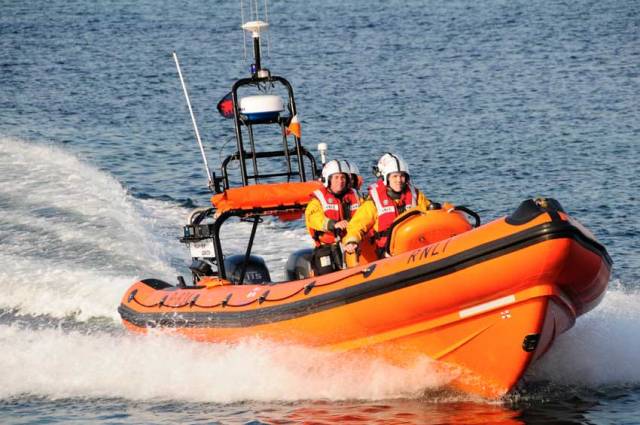#RNLI - Bundoran RNLI responded to two calls for assistance yesterday (Sunday 22 July) by an angling boat with a fouled propeller and a yachtsman suddenly taken ill.
The volunteer lifeboat crew launched after 10am following a call to go the aid of an angling boat, with two men onboard, which had got into difficulty when the boat’s propeller got tangled in lobster pots just off Bundoran.
The lifeboat, helmed by Killian O’Kelly and with three crew members onboard, launched in good weather conditions and made its way the short distance to the scene.
Having assessed that those onboard were safe and well, the lifeboat crew worked with the two men to free the boat and tow it safely back to shore.
Later in the day, the pagers sounded once more at 4.30pm, following a request from the Irish Coast Guard to assist a man who had taken ill on a yacht off Mullaghmore.
The lifeboat, helmed on this occasion by Brian Gillespie and with three crew members onboard, launched immediately and made its way to the scene. The Sligo-based coastguard helicopter Rescue 118 was also tasked.
On arrival, the lifeboat crew assessed the man before taking him onboard the lifeboat and administering casualty care. Once ashore, the man was treated for the effects of sea sickness but was otherwise safe and well.
Speaking following the callouts, Bundoran RNLI volunteer lifeboat operations manager Tony McGowan said: “We were delighted to be of assistance to both groups yesterday and glad that the outcomes resulted safely.
“We would remind everyone visiting the sea and enjoying Bundoran this summer to always respect the water. Always wear a lifejacket, always carry a means of communication and always let someone ashore know where you are going and when you are due back. Should you get into difficulty, call 999 or 112 and ask for the coastguard.”
Elsewhere, Larne RNLI was called to assist the crew of a small motorboat with engine difficulties at the entrance to Larne Harbour yesterday morning.
Larne’s volunteer lifeboat crew were preparing for a training session when the call came through at 10.10am. Both the all-weather lifeboat and inshore lifeboat launched to the casualty vessel.
Larne RNLI’s all-weather relief lifeboat the Duke of Windsor was was quickly on scene just north of the entrance to Larne Harbour. The crew quickly established a temporary tow to move the vessel out of the shipping lane to allow a P&O ferry to exit the harbour.
A line was then passed from the lifeboat and secured to the casualty vessel to tow the vessel back to Larne Boat Club.
In the shallow waters of Larne Lough the tow was passed to the inshore lifeboat Terry in order to guide the vessel onto the slipway for recovery.
Speaking after the callout, Larne RNLI coxswain Frank Healy said: “We are glad that the crew on the motor vessel knew to contact the coastguard when they got into difficulty, this is always the right thing to do. If we can be of assistance to anyone, our volunteers are here to help.”
This was the second launch for Larne RNLI in the last five days.
On Wednesday 18 July, the station's all-weather lifeboat launched with their colleagues at Bangor and Donaghadee as a precautionary measure for an aircraft inbound to Belfast City Airport that was experiencing technical difficulties.
The aircraft landed safely and all three lifeboats were stood down and returned to station.































































